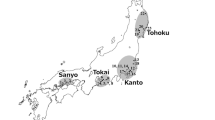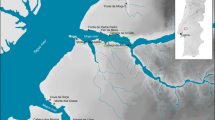Abstract
Summary
Age-related deterioration of limb bone diaphyseal structure is documented among precontact Inuit foragers from northern Alaska. These findings challenge the concept that bone loss and fracture susceptibility among modern Inuit stem from their transition away from a physically demanding traditional lifestyle toward a more sedentary Western lifestyle.
Introduction
Skeletal fragility is rare among foragers and other traditional-living societies, likely due to their high physical activity levels. Among modern Inuit, however, severe bone loss and fractures are apparently common. This is possibly because of recent Western influences and increasing sedentism. To determine whether compromised bone structure and strength among the Inuit are indeed aberrant for a traditional-living group, data were collected on age-related variation in limb bone diaphyseal structure from a group predating Western influences.
Methods
Skeletons of 184 adults were analyzed from the Point Hope archaeological site. Mid-diaphyseal structure was measured in the humerus, radius, ulna, femur, and tibia using CT. Structural differences were assessed between young, middle-aged, and old individuals.
Results
In all bones examined, both females and males exhibited significant age-related reductions in bone quantity. With few exceptions, total bone (periosteal) area did not significantly increase between young and old age in either sex, nor did geometric components of bending rigidity (second moments of area).
Conclusions
While the physically demanding lifestyles of certain traditional-living groups may protect against bone loss and fracture susceptibility, this is not the case among the Inuit. It remains possible, however, that Western characteristics of the modern Inuit lifestyle exacerbate age-related skeletal deterioration.



Similar content being viewed by others
References
Nesse RM, Williams GC (1994) Why we get sick: the new science of Darwinian medicine. Times Books, New York
Lieberman DE (2013) The story of the human body: evolution, health, and disease. Pantheon, New York
Tan VP, Macdonald HM, Kim S et al (2014) Influence of physical activity on bone strength in children and adolescents: a systematic review and narrative synthesis. J Bone Miner Res 29:2161–2181
Warden SJ, Mantila Roosa SM, Kersh ME et al (2014) Physical activity when young provides lifelong benefits to cortical bone size and strength in men. Proc Natl Acad Sci U S A 111:5337–5342
Ruff CB (2006) Gracilization of the modern human skeleton. Am Sci 94:508–514
Karasik D (2008) Osteoporosis: an evolutionary perspective. Hum Genet 124:349–356
Nowlan NC, Jepsen KJ, Morgan EF (2011) Smaller, weaker, and less stiff bones evolve from changes in subsistence strategy. Osteoporos Int 22:1967–1980
Aspray TJ, Prentice A, Cole TJ et al (1996) Low bone mineral content is common but osteoporotic fractures are rare in elderly rural Gambian women. J Bone Miner Res 11:1019–1025
Agarwal SC (2008) Light and broken bones: examining and interpreting bone loss and osteoporosis in past populations. In: Katzenberg MA, Saunders SR (eds) Biological anthropology of the human skeleton, 2nd edn. Wiley, Hoboken, pp 387–410
Perzigian AJ (1973) Osteoporotic bone loss in two prehistoric Indian populations. Am J Phys Anthropol 39:87–95
Madimenos FC, Snodgrass JJ, Blackwell AD et al (2011) Normative calcaneal quantitative ultrasound data for the indigenous Shuar and non-Shuar Colonos of the Ecuadorian Amazon. Arch Osteoporos 6:39–49
Ruff CB, Hayes WC (1982) Subperiosteal expansion and cortical remodeling of the human femur and tibia with aging. Science 217:945–948
Ruff CB, Hayes WC (1988) Sex differences in age-related remodeling of the femur and tibia. J Orthop Res 6:886–896
Pratt WB, Holloway JM (2001) Incidence of hip fracture in Alaska Inuit people: 1979–89 and 1996–99. Alaska Med 43:2–5
El Hayek J, Pronovost A, Morin S et al (2012) Forearm bone mineral density varies as a function of adiposity in Inuit women 40–90 years of age during the vitamin D-synthesizing period. Calcif Tissue Int 90:384–395
Jakobsen A, Laurberg P, Vestergaard P et al (2013) Clinical risk factors for osteoporosis are common among elderly people in Nuuk, Greenland. Int J Circumpolar Health 72:19596
Mazess RB, Mather W (1974) Bone mineral content of North Alaskan Eskimos. Am J Clin Nutr 27:916–925
Mazess RB, Mather W (1975) Bone mineral content in Canadian Eskimos. Hum Biol 47:45–63
Sharma S (2010) Assessing diet and lifestyle in the Canadian Arctic Inuit and Inuvialuit to inform a nutrition and physical activity intervention programme. J Hum Nutr Diet 23:5–17
Kolahdooz F, Barr A, Roache C et al (2013) Dietary adequacy of vitamin D and calcium among Inuit and Inuvialuit women of child-bearing age in Arctic Canada: a growing concern. PLoS ONE 8:e78987
Larsen H, Rainey FG (1948) Ipiutak and the Arctic whale hunting culture. Anthropol Pap Am Mus 42:1–276
Rainey FG (1947) The whale hunters of Tigara. Anthropol Pap Am Mus 41:230–283
Burch ES (1981) The traditional Eskimo hunters of Point Hope, Alaska: 1800–1875. North Slope Borough, Point Hope, AK
Lammert O (1972) Maximal aerobic power and energy expenditure of Eskimo hunters in Greenland. J Appl Physiol 33:184–188
Godin G, Shephard RJ (1973) Activity patterns of the Canadian Eskimo. In: Edholm OG, Gunderson EKE (eds) Human polar biology. Butterworth-Heinemann, Oxford, pp 193–215
White TD, Black MT, Folkens PA (2011) Human osteology, 3rd edn. Elsevier Academic Press, Burlington
Auerbach BM, Ruff CB (2010) Stature estimation formulae for indigenous North American populations. Am J Phys Anthropol 141:190–207
Ruff CB, Holt BM, Niskanen M et al (2012) Stature and body mass estimation from skeletal remains in the European Holocene. Am J Phys Anthropol 148:601–617
Ruff C, Niskanen M, Junno J-A et al (2005) Body mass prediction from stature and bi-iliac breadth in two high latitude populations, with application to earlier higher latitude humans. J Hum Evol 48:381–392
Doube M, Kłosowski MM, Arganda-Carreras I et al (2010) BoneJ: free and extensible bone image analysis in ImageJ. Bone 47:1076–1079
Ruff CB, Trinkaus E, Walker A et al (1993) Postcranial robusticity in Homo. I: temporal trends and mechanical interpretation. Am J Phys Anthropol 91:21–53
Laughlin SB (1985) Skeletal aging patterns of Tigara and Ipiutak Eskimo of Point Hope, Alaska. (Unpublished master’s thesis). University of Connecticut, Storrs
Burr D, Martin R (1983) The effects of composition, structure and age on torsional properties of the human radius. J Biomech 16:603–608
Riggs BL, Melton LJ, Robb RA et al (2004) Population-based study of age and sex differences in bone volumetric density, size, geometry, and structure at different skeletal sites. J Bone Miner Res 19:1945–1954
Russo CR, Lauretani F, Seeman E et al (2006) Structural adaptations in aging men and women. Bone 38:112–118
Yuen KW, Kwok TC, Qin L et al (2010) Characteristics of age-related changes in bone compared between male and female reference Chinese populations in Hong Kong: a pQCT study. J Bone Miner Metab 28:672–681
Allen MD, McMillan SJ, Klein C et al (2012) Differential age-related changes in bone geometry between the humerus and the femur in healthy men. Aging Dis 3:156–163
Webb AR (2006) Who, what, where and when-influences on cutaneous vitamin D synthesis. Prog Biophys Mol Biol 92:17–25
Odén A, Kanis JA, McCloskey EV, Johansson H (2014) The effect of latitude on the risk of seasonal variation in hip fracture in Sweden. J Bone Miner Res 29:2217–2223
Kuhnlein HV, Soueida R, Receveur O (1996) Dietary nutrient profiles of Canadian Baffin Island Inuit differ by food source, season, and age. J Am Diet Assoc 96:155–162
Specker B, Binkley T, Fahrenwald N (2004) Rural versus nonrural differences in BMC, volumetric BMD, and bone size: a population-based cross-sectional study. Bone 35:1389–1398
Pongchaiyakul C, Nguyen TV, Kosulwat V et al (2005) Effect of urbanization on bone mineral density: a Thai epidemiological study. BMC Musculoskelet Disord 6:5
Søgaard AJ, Gustad TK, Bjertness E et al (2007) Urban–rural differences in distal forearm fractures: Cohort Norway. Osteoporos Int 18:1063–1072
Kruger MC, Kruger IM, Wentzel-Viljoen E et al (2011) Urbanization of black South African women may increase risk of low bone mass due to low vitamin D status, low calcium intake, and high bone turnover. Nutr Res 31:748–758
Martrille L, Ubelaker DH, Cattaneo C et al (2007) Comparison of four skeletal methods for the estimation of age at death on white and black adults. J Forensic Sci 52:302–307
Acknowledgments
We thank D.H. Thomas, I. Tattersall, and G. Garcia at the American Museum of Natural History for facilitating analysis of the Point Hope skeletons; M. Tweedie for assistance with transporting skeletons for analysis; undergraduate anthropology students for help with data collection; B. Maley for providing morphological data from the skulls for sex assignment; and N. Blegen, L. Cowgill, O. Pearson, and M. Gomberg for critical references. We are grateful to B. Schipf, M. Axoso, and C. Mazzerese for unstinting assistance with CT scanning. Funding was provided by Stony Brook University.
Conflict of interest
None.
Author information
Authors and Affiliations
Corresponding author
Rights and permissions
About this article
Cite this article
Wallace, I.J., Nesbitt, A., Mongle, C. et al. Age-related variation in limb bone diaphyseal structure among Inuit foragers from Point Hope, northern Alaska. Arch Osteoporos 9, 202 (2014). https://doi.org/10.1007/s11657-014-0202-3
Received:
Accepted:
Published:
DOI: https://doi.org/10.1007/s11657-014-0202-3




